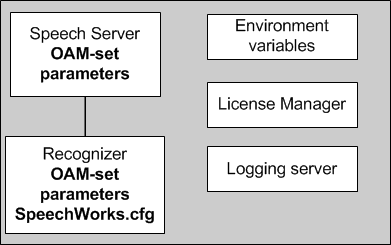Configuration during installation
During initial installation, you prepare the basic operational environment. Settings you make during installation seldom change afterwards. Important operational parameters:
- Environment variables
- Licensing parameters
- Parameters in the SpeechWorks.cfg file
- Nuance Speech Server parameters related to Recognizer.
This illustration shows a basic system. One Speech Server points to one Nuance Recognizer host. The parameters in SpeechWorks.cfg help to bootstrap the Recognizer, which then loads defaults that have been set on the Nuance recognition service in Management Station. This system is typical for application development:

A larger system is almost the same as a basic system. Normally, all recognition servers on a host share a single SpeechWorks.cfg and Management Station-set configuration.
Note: When modifying the SpeechWorks.cfg file, use the existing format as a model. Do not insert comments into the file.
Environment variable
System variable created by the Nuance Speech Suite installation:
|
Parameter |
Default |
Description |
|---|---|---|
|
|
Environment variable pointing to the Recognizer installation directory. |
Licensing parameters
Recognizer cannot run without licensing. Development systems usually require fewer licenses, and production systems require more. A runtime error occurs if the configuration requests more licenses than are available.
Once set, the licensing parameters only need to change when changing licensing capacity or moving License Manager to a new host.
|
Parameter |
Description |
Default |
|---|---|---|
|
Number of licenses to check out during initialization of the speech detector (endpointer). |
8 (licenses) |
|
|
Specifies the locations of License Manager. |
27000@localhost |
|
|
Specifies which features in the license file to enable at the start of each session. |
(all features enabled) |
|
|
The number of licenses to check out during Recognizer initialization. |
4 (licenses) |
There are additional licensing parameters for tuning purposes. See Troubleshooting licensing issues.
Site-specific parameters
Here are categories of parameters useful for various operational circumstances.
Optional. Use these parameters to define rules for fetching documents through a proxy server. The advantage of these parameters is that they apply to fetches by Speech Server, Recognizer, and Vocalizer instead of configuring proxies for each individual engine.
|
Parameter |
Description |
Value |
|---|---|---|
| server.inet.HTTPproxyRules |
Rules for using proxy servers to fetch documents from application servers using HTTP. |
DEFAULT: (none) |
| server.inet.HTTPSproxyRules |
Rules for using proxy servers to fetch documents from application servers using HTTPS. |
DEFAULT: (none) |
System administrators can set these parameters to system-wide values or different values for each application or tenant:
|
Parameter |
Description |
Default |
|---|---|---|
|
Maximum allowed size of grammars that can be dynamically compiled. |
-1 (unlimited) |
|
|
Limits the CPU and memory cost of SLMs trained at run-time. |
-1 (unlimited) |
Review these parameters, and (if necessary) change the defaults to new system-wide values:
|
Parameter |
Description |
Default |
|---|---|---|
|
Defines the expected the audio formats supplied to the speech detector. |
audio/basic;rate=8000 |
|
|
Audio formats that will be supplied to Recognizer. |
audio/basic;rate=8000 |
|
|
Defines characters that represent delimiters in URI strings. |
; and & (semicolon and ampersand) |
|
|
Adds the speech mode attribute to nomatch recognition results (to conform to VoiceXML 2.0). |
0 (disabled) |
|
|
Interval for hot insert loading of acoustic models. |
300 (5 minutes) |
|
|
Maximum number of channels to save waveforms (recordings of speech from callers). |
-1 (no maximum) |
System administrators can set these parameters to system-wide values or different values for each tenant or application:
|
Parameter |
Description |
Default |
|---|---|---|
|
Storage location of self-learning files. Controls sharing of models across the server, tenants, or applications. |
(empty) |
|
|
Assigns the same number in the filenames of related waveforms. |
0 (disabled) |
System administrators install at least one language during Recognizer installation. The first language installed becomes the system default. To support other languages, administrators install additional packs.
|
Parameter |
Description |
Default |
|---|---|---|
|
Preloads a language during Recognizer startup, and sets the default for built-in grammars. |
default (first language installed) |
Each speech grammar declares its language explicitly. If grammars use unexpected strings to designate the language, administrators can map the codes to the Nuance format:
|
Parameter |
Description |
Default |
|---|---|---|
|
Specifies a text file that maps language declarations in grammars to Nuance language codes. |
(Recognizer language codes) |
Occasionally, administrators require non-English text in diagnostic logs:
|
Parameter |
Description |
Default |
|---|---|---|
|
File that maps diagnostic log messages into any language. |
$SWISRSDK/config/SWIErrors.en.us.txt |
